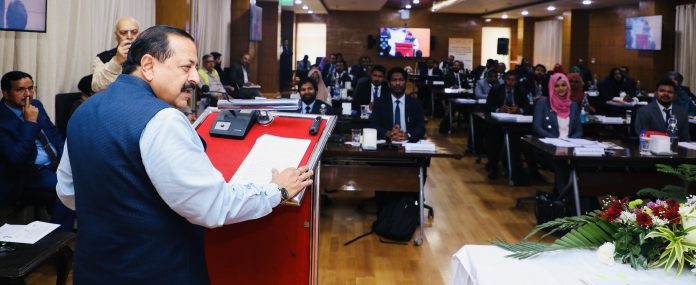
NEW DELHI, Dec 12 : Technology driven Good Governance Practices developed by India under the leadership of Prime Minister Narendra Modi are being acknowledged globally and emulated by other countries as well, Union Minister Incharge DoPT Dr Jitendra Singh said today.
Subscribing to the approach of ‘Neighbours First’, while interacting with participants of the 29th Capacity Building Program (CBP) for Civil Servants of Maldives & 1st CBP for Civil Servants of Cambodia, Dr Jitendra Singh said we are ready to share our success stories and experiences with others. Neighbours like Maldives and Cambodia have particularly much to gain from India considering the commonality of our cultural, traditional and historical legacy, he said.
The Union Minister of State (Independent Charge) Science & Technology, MoS PMO, Personnel, Public Grievances, Pensions, Atomic Energy said that India today has achieved a level in Civil Services training which is being emulated by other countries. He said that many students are visiting India from neighbouring countries for studies.
Dr Jitendra Singh said that PM Modi has focussed on ‘Maximum Governance and Minimum Government’.
“Citizen centric reforms initiated by the Prime Minister in the last over nine years has led to “Ease of Governance”, leading to ‘Ease of Living’ for the citizens,” he said.
Underlining on the optimum use of technology, Dr Jitendra Singh said that Civil Servants need to harness the potential of the Digital Revolution and embrace the latest IT innovations as a means to advance Digital Governance. He said that the emphasis is on e-governance and paperless office, which has made many things easier and simpler.
“More than 1.17 crore pensioners are submitting Digital Life Certificates, including 19.52 lakh DLCs generated using Face Authentication Technique,” he said.
Dr Jitendra Singh said that the Government’s priority has been on citizen-centricity, transparency and citizen-participation. He further said that the Government has done away with many obsolete rules and laws.
“Government led by PM Modi maintains a ‘Zero Tolerance Approach to Corruption,’ with strengthened legislative frameworks and mandatory asset declarations for civil servants. Technology enabled Good Governance Practices have also eliminated the role of middlemen in distribution of benefits of welfare schemes,” he said.
Dr Jitendra Singh said that Govt of India’s policy is on promotion of Public-Private Participation.
“Government is working on a roadmap, both short and long-term, with an AI technology-based Vision of 5/10 and 25 years. The role of Civil Servants is key to its realization being the medium between the Government and the People,” he said.
Dr Jitendra Singh said that Capacity Building Training programmes have now been institutionalised and developed into a healthy convention.
“These initiatives will help in promoting healthy relations with the neighbouring countries,” he said.
Speaking on the occasion, Shri V Srinivas, Secretary, DAR&PG & DoPPW and Director General, NCGG, said the CBP programmes are aimed at sharing new concepts, paths breaking initiatives/programmes being implemented for the welfare of the people at the last mile. These initiatives have substantial social and economic impact. Effective dissemination of such knowledge and experiences will enable the officers in realising full and complete benefits of these emerging concepts in good governance and public policy.
Forty each Civil Servants from Maldives and Cambodia interacted with the Union Minister during the session in New Delhi. The Cambodian participants were present through video conference from NCGG, Mussoorie.
The Capacity Building Programmes being conducted by the National Centre for Good Governance (NCGG) at Mussoorie and Delhi are in pursuance of the Memorandum of Understanding (MoU) signed between India-Maldives in 2019 aimed at training 1,000 civil servants of Maldives over a period of 5 years. So far NCGG has successfully trained over 965 officials in 29 batches.
The batch from Cambodia is part of the first Capacity Building Training Program for Cambodia Administrative Service, being conducted by NCGG. Three more programs are planned for the officers of Cambodia in the coming year for 160 officers. By the end of next two years, NCGG plans to do these capacity building training program for 500 officers from Cambodia.
NCGG, in partnership with MEA, has imparted training to civil servants of 15 countries viz. Bangladesh, Kenya, Tanzania, Tunisia, Seychelles, Gambia, Maldives, Sri Lanka, Afghanistan, Laos, Vietnam, Nepal Bhutan, Myanmar and Cambodia. Recognizing the increasing demand, NCGG is proactively expanding its capacity to accommodate a greater number of civil servants from an expanding list of countries. This expansion is aimed at meeting the rising demand and ensuring that more nations can benefit from the expertise and resources offered by the NCGG.

